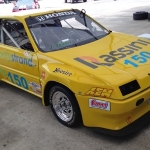Polystrand Inc., a Denver-based manufacturer of thermoplastic composite materials, used TUFROV® 4510 andTUFROV 4588 fiber glass roving products by PPG to build a racecar featuring the world’s first thermoplastic composite rear suspension. The Grand Touring Lite (GT-Lite) racecar was designed by Jonathan Spiegel, senior engineer, Polystrand, who drove the car in a Sports Car Club of America (SCCA) event in Houston. He said the vehicle was built to demonstrate that continuous-fiber-reinforced thermoplastic resin is an excellent material for automotive suspension and structural components. “There are light-truck and passenger-car suspensions equipped with composite springs, but they have always been made with thermoset resins,” Spiegel explained. “We believe our car is the first in the world to employ a thermoplastic resin, which offers distinct advantages over thermoset resin, such as faster production cycle times, higher impact resistance, easier recyclability and no VOC (volatile organic compound) emissions during processing.”
Polystrand chose a GT-Lite racecar as its innovation platform because SCCA rules give engineers the freedom to try new materials and ideas in their vehicle designs. In the Houston SCCA race, the Polystrand car was in second place when an electrical failure forced it to withdraw.













